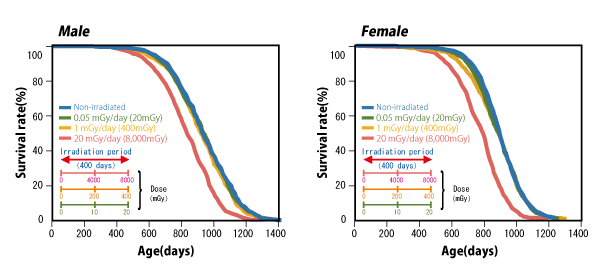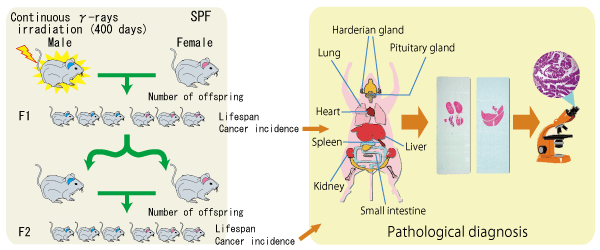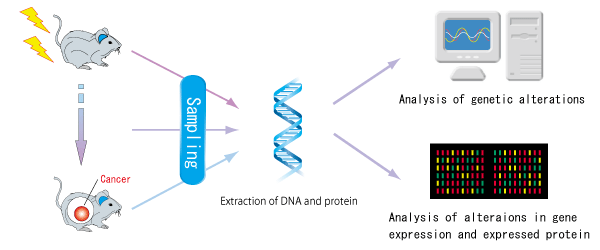Department of Radiobiology
The effects of continuous low dose-rate radiation exposure on the gene expression, protein synthesis, cellular and tissue responses are studied using experimental animals.
The results of these studies should be useful for the estimation of human risks.
Lifespan study on mice continuously exposed to low-dose-rate gamma-rays
The Institute for Environmental Sciences (IES) has revealed in the previous study using 4000 adult specific-pathogen-free (SPF) mice that continuous gamma-ray irradiation for approximately 400 days a high dose of 8000 mGy at a low-dose-rate of 20 mGy/day resulted in significant life-shortening mainly due to early neoplastic death as compared to non-irradiated controls, but no significant difference in lifespan was found in mice irradiated continuously with low-dose of 20 mGy at a low-dose-rate of 0.05 mGy/day. It was also shown that several tumors were significantly induced in mice continuously irradiated at 20 mGy/day.

Based on such results obtained from the lifespan study on somatic effects, the Department of Radiobiology currently studies the following research projects using mice on the biological effects of low-dose-rate and low-dose radiation exposure.
Transgenerational effects in mice exposed to continuous low-dose-rate gamma-rays
In order to study the effects of continuous low-dose-rate gamma-ray irradiation on the progeny mice, males (sires) were irradiated for 400 days with gamma-rays at low-dose-rate of 20 mGy/day, 1mGy/day, and 0.05mGy/day with accumulated dose equivalent to 8000mGy, 400mGy, and 20mGy, respectively. Immediately after completion of irradiation, the male mice were bred with non-irradiated females to produce F1 mice. Randomly selected F1 males and females were bred to produce F2mice. All mice except dams of F1 mice, were subjected to pathological examination upon natural death. Lifespan, cancer incidence and number of offspring were used as parameters to evaluate the biological effects of low-dose-rate irradiation.

Effects of continuous low-dose-rate radiation exposures on bio-defence system and tumor-related genes
The results of gLifespan studyh suggest that life shortening in mice continuously exposed to low-dose-rate radiation is due to early death from a variety of neoplasms and not from increased incidence of specific neoplasms.
What are the mechanisms of early death seen in Lifespan study?h To elucidate this, the following studies have been performed;
- Mechanisms of neoplastic and non-neoplastic disorders related to the bio-defence system
- Mechanisms of carcinogenesis associated with oncogenic alterations








